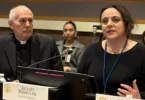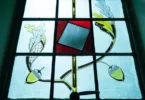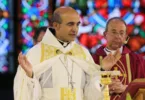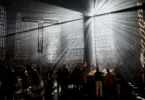by Angelus News Staff
(OSV News) — On Easter Sunday, Nicaraguan Cardinal Leopoldo José Brenes Solórzano expressed his joy at the massive attendance of Catholics in churches during Holy Week. The government of Daniel Ortega tried to “cancel” Holy Week this year, prohibiting all expression of faith in the streets.
“I am glad because of the reports, the comments I have received from the priests, from their parishes, [is that in] all the liturgy, our churches have been practically full,” Cardinal Brenes, also the archbishop of Managua, said during his homily at Easter Mass.
He added, Nicaraguan Catholics lived Lent with “ups and downs, but in the end, here we are.”
The regime of Ortega and his wife, Rosario Murillo, through the national police, sought to prohibit processions in the streets, enforcing a ban in effect since Lent began in February. The government refused to authorize the traditional Stations of the Cross that are celebrated publicly in all dioceses throughout the country.
The police order was adopted after Ortega, president of Nicaragua and supreme chief of the national police, branded priests, bishops, cardinals and Pope Francis himself as “a mafia.” He also has accused the bishops of being coup plotters and children of the devil.
“I have felt the blessing and grace of the Lord that during our three [main] celebrations, the cathedral church has been completely full,” continued Cardinal Brenes, who highlighted, in particular, the massive participation in the penitential Stations of the Cross “celebrated around” the Managua cathedral.
The news agency EFE reported that on Good Friday, the Metropolitan Cathedral of Managua welcomed thousands of Catholics who gathered outside it to participate in the traditional penitential Stations of the Cross, which recalls the Calvary of Jesus Christ before being crucified.
“There are our faithful there, in an act of thanksgiving to the Lord, participating and living the great mysteries. I believe that the Lord has blessed us, and, without a doubt, we have celebrated this time with much joy, with much interiority,” the cardinal said on Easter Sunday.
Brenes also highlighted that thousands of Catholics followed the Eucharist during Holy Week virtually through the live transmissions made by the Archdiocese of Managua in its social networks.
The persecution against the Catholic Church in Nicaragua is so dramatic that the Office of the United Nations High Commissioner for Human Rights (OHCHR) had asked the government to allow “the celebration of religious processions,” pointing out that “its generalized prohibition violates religious freedom, which requires that all people can exercise it individually and collectively, both in private and in the public sphere.”
According to reports, at least 21 people were detained by police during Holy Week celebrations, in an attempt to dissuade others from publicly and freely expressing their faith.
The ban on living the faith in public is one more of many measures that the Ortega and Murillo regime had taken against the church since 2018, when bishops and priests opened the doors of temples to protect peaceful protesters who were violently repressed with bullets and cannons.
During 2022, the government expelled the apostolic nuncio from Nicaragua, Sisters of Charity, the order founded by Mother Teresa of Calcutta, and several priests, most of whom are today in exile in Miami, where Auxiliary Bishop Silvio Baez of Managua, took up residence in 2019 when he was forced to leave the country.
In February of this year, Bishop Rolando Álvarez of Matagalpa and administrator of the Diocese of Estelí, was clandestinely sentenced to 26 years in prison, without evidence, without witnesses and without the right to due process. This conviction occurred the day after he refused to be deported to the United States with more than 200 other Nicaraguan political prisoners. The international community, and Pope Francis, has publicly denounced the conviction of Bishop Alvarez and the deportation of Nicaraguans from their homeland.






